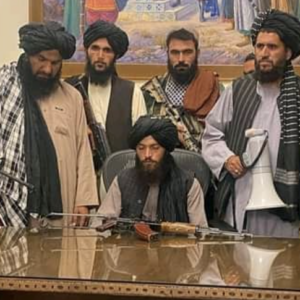The world needs the full participation of the people of Afghanistan – particularly its women and girls – to have any hope of achieving the sustainable development goals the United Nations has set for 2030.
As the international community refocuses on climate change and attempts to turn the page on the 20-year war in Afghanistan, it shouldn’t lose sight of how closely the 17 sustainable development goals align with ongoing needs in Afghanistan. At their core, the goals are about human rights. And the fact of the matter is the Taliban aren’t just ignoring them, they’re actively working against them.
The top five goals – no poverty, zero hunger, good health and well-being, quality education, and gender equality – are all beyond the reach of most Afghan women and girls now that the Taliban have re-established control over their country.
As international leaders reaffirmed their “promise” to the objectives outlined in the sustainable development goals during the U.N. General Assembly, the Taliban have continued their efforts to remove and exclude women and girls from every facet of public life. In a matter of weeks, 20 years of gains have been quickly and egregiously eliminated.
In the new Afghanistan – as in 1990s Afghanistan – women and girls have been shut out of schools, the workplace, and government. They cannot leave their homes without a male family member.
As critical pillars in the pursuit of democracy, security, and development, some of the most courageous women in this world have been threatened, assaulted, and killed by the Taliban for making the very impact that was previously celebrated by the international community.
Moreover, since the Taliban asserted full control over Afghanistan in August, scarcities of food, water, and basic health care as well as the likelihood of imminent economic collapse have made the struggle for daily life extraordinarily difficult for ordinary Afghans. Already, at least 1 million Afghan children are at risk of severe acute malnutrition and could die without access to lifesaving treatment, according to UNICEF.
As a global community, we cannot claim we’re making progress in achieving the development goals if the rights and well-being of Afghan women and children continue to erode.
We have mechanisms for accountability. We have ways we can show our solidarity. We have resources and influence to support this marginalized population.
The Taliban are keen to claim recognition and legitimacy among the international community. In September, they nominated Mohammad Suhail Shaheen as Afghanistan’s ambassador to the United Nations and asked that their foreign minister, Amir Khan Muttaqi, be allowed to address the United Nations General Assembly.
A scheduled speech at the end of the General Assembly by Ghulam Isaczai, the recognized ambassador appointed by the elected government, was canceled at the last minute without explanation.
It will ultimately be up to the U.N.’s nine-member credentials committee to decide who constitutes the legitimate representative of Afghanistan. But make no mistake, based on the Taliban’s current track record, these requests should be categorically denied.
The U.N. has turned away oppressive actors before. The Taliban should be no different.
The U.N. and the international community have an obligation to protect Afghanistan’s women and girls and other vulnerable populations – not to legitimize the depraved rule of the Taliban, who have openly stated and demonstrated their disregard for the equal and rightful inclusion of half of their population. Left unchecked, the Taliban’s brutality only stands to grow further.
The U.N. and international donors should quickly mobilize and sustain increased humanitarian aid into Afghanistan, particularly to meet acute needs for food and medical supplies. Next, they should establish a humanitarian corridor out of Afghanistan for those who remain at imminent risk from the Taliban. Intergovernmental organizations should work closely with regional nations to ensure that borders remain open, asylum is available, and refugee conventions are followed.
Most importantly, the U.N. must uphold the protection of Afghan women and children’s individual rights, well-being, and agency in keeping with its own international human rights guidelines and sustainable development goals. Those most affected by the events in Afghanistan must be represented among decision-making forums, and Afghan women must have increased opportunities to speak truth to power.
As Eleanor Roosevelt, the first chairperson of the United Nations Commission on Human Rights, said so eloquently, “Unless these rights have meaning [everywhere], they have little meaning anywhere.”
Her words hold true many decades later.
If the world is truly to achieve its sustainable development goals by 2030, the international community must affirm its commitment to all the people of Afghanistan.

